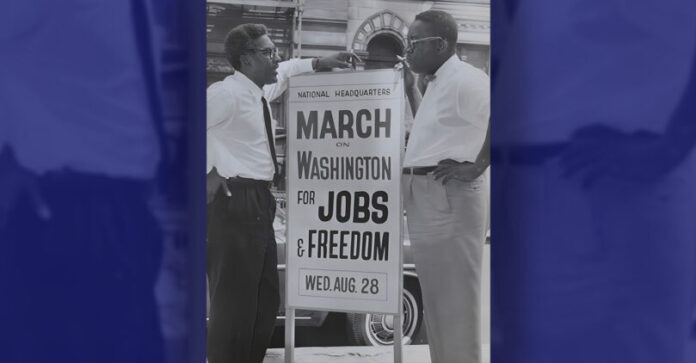
By Tamieka Atkins, NNPA Newswire
Sixty years ago, more than 200,000 people descended upon the National Mall for the March on Washington for Jobs and Freedom, making a stand for freedom and equality. Black people, women, and poor people had been treated like second-class citizens for too long, and it was time to demand justice.
The March led to unprecedented federal legislation addressing the systemic racism and economic injustices that had plagued Black people through slavery and the Jim Crow era. Within a year, the Civil Rights Act of 1964 was signed, followed by the National Voting Rights Act of 1965 a year later. Sit-ins, protests, and other demonstrations set the stage for change, but the March on Washington set a new standard for civic engagement and exemplified the impact that could be accomplished when we organize broad coalitions toward a common goal. Those lessons will stand the test of time. The march remains a call to action for social justice advocates to continue the fight against discrimination, voter suppression, police brutality, and wage disparity. It is also a platform to elevate the greater narrative on racial injustice.
Now, as we commemorate August 28, 1963, we understand that while progress has been made, we have so much more work to do. Our democracy is fragile, and we face new threats each day.
In Georgia, threats against democracy linger around every corner. Over the past five years alone, potential voters have faced a new wave of voter purges, the elimination of polling places, reductions in early voting options, limitations on the use of mail-in/absentee ballots, efforts to undermine poll workers and legislation that would subject citizens to a criminal investigation by the Georgia Bureau of Investigation for claimed suspicion of voting irregularity. We’ve always been a hotbed for civil rights and social justice, but recent years have shown just how far some people will go to suppress the will of the people. The needs of real people too often take a backseat to partisan jockeying, rampant mis- and disinformation, and wholesale agendas reversing decades of legal precedent promoting equity. At this moment, we cannot afford to view the March as a thing of the past. The fight for our most basic civil rights never ended. We need urgent action and consistent civic engagement.
That’s why for more than a decade, ProGeorgia has worked to help uphold the legacy of community organizing, civic engagement, and viable policy change set forth by the trailblazers behind the March on Washington. Alongside our 61 partner organizations, we continue to employ smart, robust, and innovative strategies to rebuild democracy and magnify civic engagement. While we organize for equity in our state, we also try to provide a framework for creating people-centered, positive change nationwide.
What we’ve found most effective is centering our work around three major premises: relational, rather than transactional engagement; elevating the values, views, voices and leadership of women of color; and embracing, amplifying, and mobilizing young people.
“Change happens at the speed of trust,” said Stephen M.R. Covey, and the Rev. Jennifer Bailey added that “relationships are built at the speed of trust, and social change happens at the speed of relationships.” Thus, longstanding, systemic, and generational change is built over time by creating meaningful relationships. It’s not enough to rally folks for a single election or campaign. You must give people a real reason to believe that their voice and vote matters. Even more, you must show them how to engage in the democratic process regularly, beyond election cycles, and remind them that our systems are only as strong as the people who run them. We must hold those elected and appointed officials accountable to the will of the people.
Beyond non-transactional relationships, it’s important to center and elevate the voices, values, and leadership of people guiding this work every day, many of whom are Black women and women of color. The face of civic engagement must reflect the communities being served. We need more brown, black, queer, and differently-abled people as activists, organizers, candidates, policymakers, judges, district attorneys, and lawmakers.
Even as we strive toward greater inclusivity, we must also embrace and elevate the ideals and actions of young people. At the time of the March on Washington, Martin Luther King, Jr. was 34 years old, and Georgia’s own senior statesman, John Lewis, was just 23 and a fierce advocate for justice. Young people have always been at the heart of movements for civil rights and social justice, and real progress requires that we continue to amplify their efforts. Engaging them today means speaking their language and empowering them to engage on their own terms.
So, the 60th anniversary of the March on Washington represents a commemoration and a continuation of the work that’s already been done to make America live up to her promise. As Anna Hedgeman wrote in her memoir The Trumpet Sounds
: A Memoir of Negro Leadership, “We will not rest until there is justice in our beloved country, and we know that as justice comes to all Americans, it will come in increasing measure to the rest of the world.”
Tamieka Atkins is the executive director of ProGeorgia, a nonprofit dedicated to strengthening democracy in the state. To learn more about our effort to protect Georgians’ voter rights, visit www.govotega.org.

